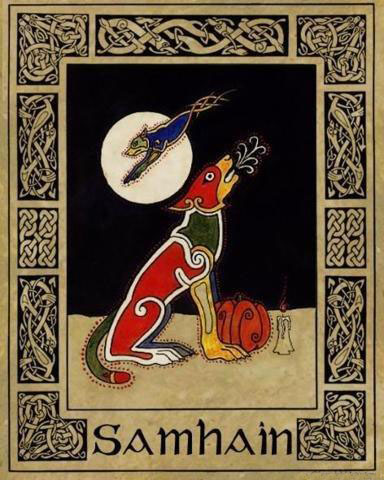Lughnasa and the Michaelmas Moon
 Monday gratefuls: My sisters: Mary, BJ, Sarah, Anne. My brother: Mark. My ancient brothers: Tom, Paul, William, Mario. Family. It is both what you make it and part of what made you. Three-hole punch. Internet recipes. Cooking. Inogen. Rain and a cool night. Living on the Mountain top.
Monday gratefuls: My sisters: Mary, BJ, Sarah, Anne. My brother: Mark. My ancient brothers: Tom, Paul, William, Mario. Family. It is both what you make it and part of what made you. Three-hole punch. Internet recipes. Cooking. Inogen. Rain and a cool night. Living on the Mountain top.
Sparks of Joy and Awe: Rain on the deck
Tarot: Nine of Stones, Wildwood Deck
 The Wildwood deck bases its suits and major arcana in Celtic myth and lore. And, it correlates them to the Great Wheel. I’m learning from the deck, deepening my own thinking about the Great Wheel, about this World, this Earth onto which I was thrown along with each of you reading this.
The Wildwood deck bases its suits and major arcana in Celtic myth and lore. And, it correlates them to the Great Wheel. I’m learning from the deck, deepening my own thinking about the Great Wheel, about this World, this Earth onto which I was thrown along with each of you reading this.
My interest in the Great Wheel ignited during my search for a theme, a focus for writing. Kate suggested I look into my heritage. At the time I knew about Richard Ellis, my indentured servant ancestor who arrived in the U.S. in 1707. His father, a captain in William and Mary’s occupying army in Ireland, came from Wales. Denbigh. I also knew that the Correls, also on my father’s side, immigrated during the Great Potato famine in the late nineteenth century.
So, things Celtic. I expanded my reach later on into Northern European myth and legend. Genetics put this strain of my family history as more significant than the Celtic, but I was well into the Celtic material before I got genetic information through 23andme.
 This learning coincided with my leaving the Presbyterian ministry and moving toward Unitarian-Universalism. I found(find) the UU movement liberating, but thin soup. It’s a nice refuge for folks fed up with traditional religious institutions, but in itself it offers only a bland diet of warmed over religious thought disconnected from its roots, decent poetry, and a laudable willingness to take action for social justice.
This learning coincided with my leaving the Presbyterian ministry and moving toward Unitarian-Universalism. I found(find) the UU movement liberating, but thin soup. It’s a nice refuge for folks fed up with traditional religious institutions, but in itself it offers only a bland diet of warmed over religious thought disconnected from its roots, decent poetry, and a laudable willingness to take action for social justice.
Though I transferred my credentials to the UU, I found my attempts to enter its ministry regression. After a couple of embarrassing and unnecessary attempts. (Kate told me I was making a mistake.) I needed to write, to be away from religious institutions. Not try again in a profession which did not fit me from the beginning.
After I left my ministry monkey back in its theological jungle, I became a flat-earth humanist. Atheist. No afterlife. Death=extinction. No world beyond the phenomenal one. And that one only as it can be understood through science. Logic. Yes. Data. Yes. Facts. Yes. Myth. No. Other World. No. Spirituality. No. Learning from poetry and the world’s religious traditions? No.
 Oh, I used the Celtic and Northern European folk traditions in my writing, yes. But, did I believe it? No. How could I?
Oh, I used the Celtic and Northern European folk traditions in my writing, yes. But, did I believe it? No. How could I?
Yet. The Great Wheel. Fit so well with my Thomas Berry inflected view of climate change work: creating a sustainable future for humans on this planet. It helped me into the thought world, the faith world of the early Celts.
When Kate and I moved to Andover in 1994, I’d already written three novels using the faith worlds of early Irish, Welsh, Scots, Cornish, and Breton folk. And, one using the Ragnarok idea from Northern European faith worlds.
We wanted to grow perennial flowers. Have fresh cut flowers every day. So, I learned about spring ephemerals, corms, tubers, bulbs. Food for them. The culture they needed in terms of soil, light, protection.
Then vegetables. A degree in horticulture by correspondence from a university in Guelph, Ontario. An orchard. Bees. A fire pit.

Our life together, Kate and mine, had Irish Wolfhounds, Whippets, and plants. Lots and lots of plants. We worked together, sweated together. Got sticky harvesting honey. Steamed from canning. Drying and freezing became a usual part of our fall.
It was hard manual labor and I loved it. So did Kate. We also loved each other and who each other was when working outside. When putting food by.
As the life of our gardens became our lives, the Great Wheel began to make deeper and deeper inroads into my heart. The Winter Solstice became my High Holiday. Or, my Deep Holiday. I celebrated the Celtic holidays, wrote e-mails and blog posts about them in addition to using them in my novels.
 At some point I realized I had become a pagan. Not in any particular sense like Wicca, or Druidry, or Witchcraft, just an ordinary pagan, a person who found his religious life adequately nourished by the turning of the seasons, by the natural world, by love.
At some point I realized I had become a pagan. Not in any particular sense like Wicca, or Druidry, or Witchcraft, just an ordinary pagan, a person who found his religious life adequately nourished by the turning of the seasons, by the natural world, by love.
I’ll get to the nine of Stones later, but it supports this journey in a very specific way.
